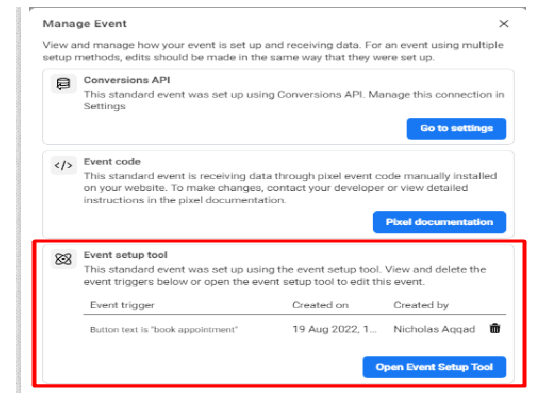Checklist to review web CAPI setup
The Web Conversions API (CAPI), formerly known as Server-Side API, is designed to help businesses deliver personalized advertising experiences to customers while maintaining data privacy. This is achieved by creating a direct connection between marketing data and systems that optimize advertising targeting lower cost per action, and measure results across ads technologies, without relying on browser-based tools like cookies CAPI operates without relying on traditional browser- based tools such as cookies, addressing privacy concerns in today's digital landscape.
1. DNS Mapping:
Our first party onboarding solution is hosted on a subdomain of the website itself for e.g., tracking.datahash.com. Hence, we need the client to confirm the sub-domain name beforehand, making sure that the subdomain does not exist or being used for any other purpose. beforehand, making sure that the subdomain does not exist or being used for any other purpose.
Our first party onboarding solution is hosted on a subdomain of the website itself for e.g., tracking.datahash.com. Hence, we need the client to confirm the sub-domain name beforehand, making sure that the subdomain does not exist or being used for any other purpose. beforehand, making sure that the subdomain does not exist or being used for any other purpose.
To map the freshly created subdomain, the client needs to add the DNS records provided by the application, similar to the one given below, to their domain registry. This step can be performed only during or after the call. Hence, to complete the implementation under guidance of Datahash, domain manager or team members handling DNS records should be available.
2. Verify currency and value parameters for the Purchase event.
For the Purchase standard event, property currency is a required field and is crucial for accurate reporting.
3. DhPixel Replacement or NeoTag Implementation
There is need to replace clients existing basecode with DhScript code. Ensure the script is correctly placed for optimal functionality. Alternatively, you can implement the NeoTag as well.
There is need to replace clients existing basecode with DhScript code. Ensure the script is correctly placed for optimal functionality. Alternatively, you can implement the NeoTag as well.
4. Access Levels to Tag Manager
Check for edit level access to Tag Manager to configure web events correctly. Access at this level
allows the configuration and modification of tags, triggers, and variables within Tag Manage
ensuring that web events are accurately tracked.
Check for edit level access to Tag Manager to configure web events correctly. Access at this level
allows the configuration and modification of tags, triggers, and variables within Tag Manage
ensuring that web events are accurately tracked.
5. Preview Link for Google Tag Manager
It is required to debug and troubleshoot any issues with event implementations before deploying changes live.
6. Access Levels to Ad Platforms Events Manager (Optional)
View level allows monitoring the performance of events and troubleshooting data discrepancies or
issues related to tracked events. Level of access can be a different according to ads manager
platform.
platform.
7. Disable Event Setup Tool
Ensure the event setup tool is disabled to prevent issues with CAPI events firing.

8. If multiple domain has same pixel, Allow our subdomain via adding content security policy in HTML code
Content Security Policy (CSP) is a security feature that helps prevent cross-site scripting (XSS) and
8. If multiple domain has same pixel, Allow our subdomain via adding content security policy in HTML code
Content Security Policy (CSP) is a security feature that helps prevent cross-site scripting (XSS) and
data injection attacks by controlling which resources (e.g., scripts, images, fonts) can be loaded and
executed on a web page. CSP is implemented as an HTTP header that you include in your web
server's response to a web page request.
executed on a web page. CSP is implemented as an HTTP header that you include in your web
server's response to a web page request.
9. Get the custom event whitelisted from CAPI
Please note that these mappings are done by default, but can be customized to meet your specific needs. If the event name in your payload does not match any of the standard events, Datahash will categorize it as a "Custom Event".
Related Articles
Pre-requisites of Snap Web Conversions API
Following are few pre-requisites required for Snap Web CAPI: Datahash account login with Website source and Snap web CAPI destinations connectors enabled Access to Domain Manager of your website domain for setting up a new sub-domain Access to Google ...Overview of Snapchat Web Conversions API
Overview of Snapchat Web CAPI: Snap’s Conversions API (CAPI) for web is a structured, privacy-centric interface that allows you to directly pass web events to Snap via a Server-to-Server (S2S) integration. This helps Snapchat’s system to optimize ...App CAPI (Conversions API for App) Integration Guide
Overview: App CAPI enables server-to-server (S2S) event tracking for mobile apps, improving measurement accuracy in privacy-restricted environments like iOS (post-ATT) or Android with limited advertising ID access. It ensures more reliable ...Setting up Destination as TikTok Web Events API
Set-up Process The process to setup the TikTok Events API is detailed below. The Setup process is same for both type of connection modes. It is a fairly simple process and can be done in 2 ways – either use Login with TikTok to automatically fetch ...Overview of TikTok Web Events API
Overview: TikTok for Business offers tools that allow businesses to share the events on their website with TikTok. TikTok Events API is designed to give our advertisers a more reliable connection between TikTok and advertiser’s marketing data ...